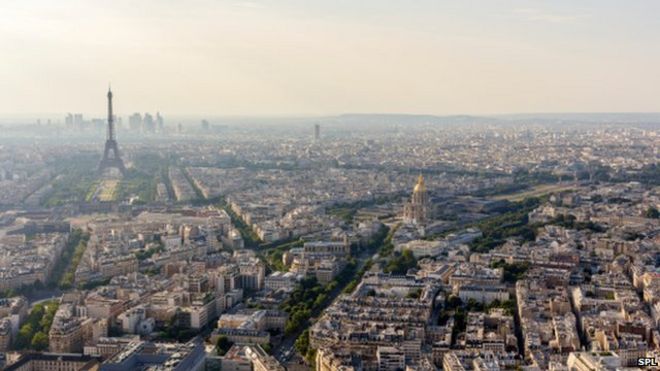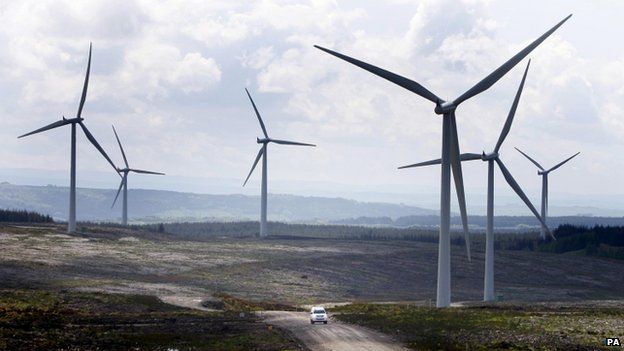G7 pledges to end fossil fuel use this century - Telegraph
However, there is doubt as to whether this can be achieved:
G7 summit, climate change: World should phase out fossil fuels by 2100
June 8, 2015 6:54 pm

G7 leaders’ support for an end to fossil fuel pollution before the end of this century marks a turning point in more than 20 years of efforts to tackle climate change.
But many questions remain about whether such an outcome will ever be achieved.
Until now, the G7 and other world leaders have agreed to do their best to stop global temperatures rising more than 2C from pre-industrial times, a goal that even the largest fossil fuel producing nations have been happy to back.
At their meeting in a Bavarian castle on Monday, the G7 leaders specifically said they wanted greenhouse gas emissions cut by 40 to 70 per cent by 2050, from 2010 levels, in line with the “decarbonisation of the global economy over the course of this century”.
That is a much more precise long-term target than previously agreed.
But farther north, in another part of Germany, a very different meeting was taking place where the challenges of reaching such a goal have been painfully evident over the past week.
The city of Bonn is home to the UN secretariat that oversees the sprawling global climate negotiations that have now been going for more than two decades in an effort to curb warming greenhouse gas emissions.
Those talks are due to culminate in a meaningful global agreement to cut emissions, due to be signed by nearly 200 countries at a conference in Paris in December.
As part of that process, hundreds of negotiators began a two-week meeting in Bonn on June 1 where a main aim was to slim down a bulky, repetitive draft negotiating text for Paris that is nearly 90 pages long.
By the end of the first week, some officials were already frustrated by progress so glacial that only a fraction of this streamlining work had been done.
“We must redouble our efforts,” Ilze Pruse, an EU delegate, said on Friday. “We have fewer than 15 negotiating days left before Paris. We can’t afford to waste a single one of them.”
But progress is slow because countries still have fundamental disagreements about what should be in the final text.
In depth

The latest news and analysis on the world’s changing climate and the political moves afoot to tackle the problem
Chief among these is a dispute over precisely how much wealthy countries should do to cut their emissions compared with poorer nations.
Many rich countries say the main point of the talks is to come up with the types of emissions cuts the G7 leaders backed on Monday.
Less developed nations say wealthier countries must also spell out exactly how they are going to come up with the $100bn a year by 2020 promised at earlier talks for poorer countries to transform their energy systems and adapt to climate change.
The G7 leaders pointedly reaffirmed their support for this funding goal on Monday, but failed to offer the detail many developing nations want.
There is also much uncertainty about how the emissions pledges countries are due to make in Paris will be monitored and ratcheted up in coming decades to ensure the broader decarbonisation plans backed by the G7 occur.
Many wealthy countries back a tough review process. But officials from China and elsewhere have been less supportive, raising questions about whether any deal reached in Paris will last long enough to produce the deep emissions reductions the G7 has now said it wants.
Long road ahead as G7 fixes on climate change targets - FT.comThe issue is still highly political in the United States:
California keeps talking climate change, but who’s listening? | The Sacramento Bee
As it is in other parts of the English-speaking world:
As it is in other parts of the English-speaking world:
Paris 2015: Tony Abbott viewed by French as reluctant actor on climate change
And in the UK, the new Energy Secretary seems determined to tackle the issue:
'Beautiful' nuclear power stations can win over sceptics, says Energy Secretary Amber Rudd - UK Politics - UK - The Independent
And in the UK, the new Energy Secretary seems determined to tackle the issue:
Ms Rudd admits the Conservative Party has an issue with climate change sceptics – although she insists that Labour harbours just as many MPs who are sceptical.
“In my experience as minister I found there were just as many Labour MPs as Conservative MPs who spoke out with their doubts about it. I’m not in denial – I’m aware that some of my colleagues aren’t as committed as I and the Prime Minister are. But I’m going to be engaging with them, talking to them and hopefully winning them over,” she says.
She has set up a meeting with Lord Lawson, Britain’s most high-profile climate-change sceptic, as the first part of her campaign to win over the doubters.
“I will be having a conversation with him. I’m hoping to win him over, so great is my ambition. But we will see. He’s a big voice and he was a remarkable Conservative politician and Chancellor so I’m interested in what he has to say. And I hope he will be interested in what I have to say. He’s an intelligent man and I’d like to engage with him on what his issues are.”
She also visited the Thames Barrier recently:
New climate change chief visits Thames Barrier on World Environment Day
Amber Rudd says the barrier is one of the country's best defences – but acknowledges that it won't stem the tide if the world doesn't act against global warming
The woman in charge of climate change reduction has visited the most iconic pieces of engineering designed to counter the threat from global warming.
New Energy and Climate Change Secretary Amber Rudd chose to mark World Environment Day (June 5) to visit east London’s Thames Barrier.
The Barrier was initially designed to be closed on average once every six years and was closed just four times throughout the 1980s. However, the closures have increased dramatically and between February 8 and 17, 2014 this year, during the height of that year’s floods, it was closed a record-breaking 20 times.
The barrier protects 125 square kilometres of central London from storm surges, but rising sea levels as a result of climate change is increasing the risk these surges will become larger and more damaging.
Energy and Climate Change Secretary Amber Rudd was accompanied by Environment Agency chairman Sir Phillip Dilley.
She said: “The Thames Barrier is one of our best protections. But barriers like this can only do so much – the world must act now to cut emissions and build a cleaner future, and this year World Environment Day is more important than ever to focus minds ahead of crunch climate talks in Paris.
Here's an overview of the 'crunch' from the BBC:
Climate change: The bumpy road to the Paris talks
- 1 June 2015
- Science & Environment

In little more than six months' time representatives of almost 200 countries will sit down in Paris to thrash out a deal on climate change.
The momentum is building, with environmentalists, politicians and scientists all keen to avoid what one called a "Copenhagen 2 scenario".
Behind the headlines there appears to be an effort to manage expectations.
And a whole new lexicon is building around the talks at the end of the year.
Take INDCs - Intended Nationally Determined Contributions. These are the actions to reduce carbon emissions which countries are pledging to commit to from 2020 onwards.
Scientists are already warning that the goal of limiting climate change to no more than 2 degrees over pre-industrial levels looks set to fail, based on an analysis of the submissions declared so far.
Only this month, research led by Professor Nicholas Stern, a prominent UK voice on climate change, said: "It seems unlikely that the pledges from all countries before the Paris summit will collectively be sufficient to bridge the gap to an emissions pathway that is consistent with the limit of 2°C."
Low carbon world
But others appear more optimistic. Johan Rockstrom, of the Stockholm Resilience Centre in Sweden, told me in April that the world had moved on since Copenhagen, and was now better informed.
"We have so much more evidence compared to 2009 on the opportunities to succeed in the transformation towards a low carbon world economy, and secondly we have much more science to support the necessity of urgent action," he said.
"Solar and wind technology in particular is now at grid parity - or is competitive compared to fossil fuels."
In preparation for the Paris summit, an interim UN meeting is getting under way in Bonn, Germany.
Several INDCs are already in, including the pledges of large emitters such as the EU and the US.


The Paris talks
- UN negotiations are in progress to develop a new international climate change agreement that will cover all 195 countries
- The new agreement is set be agreed at the Paris climate conference in December 2015 and implemented from 2020
- The climate conferences in Warsaw (2013) and Lima (2014) agreed that all countries were to put forward their proposed emissions reduction targets for the 2015 agreement as "INDCs" before the Paris conference
- The UN will publish these contributions and prepare a synthesis report by 1 November to assess whether they put the world on track to keep global warming below 2 degrees
- Before the Paris conference, negotiations will continue at interim meetings in June, September and October in Bonn
Source: European Commission

Once all are in by the autumn, they will be put into something that resembles a giant spreadsheet, which will form the basis of the negotiations in December.
It is this process that makes Paris very different from previous climate talks.
Paradigm shift
According to Oliver Geden, from the German Institute for International and Security Affairs, there is a paradigm shift under way in international climate policy, with the move from a top-down to bottom-up approach. And it creates a paradox.
"If you look at it from a procedural point of view, INDCs are a success," says Dr Geden. "If you look at it from an outcome point of view, it's clearly not enough to keep us below 2 degrees."
So what can we expect to see in the coming months?
Scientists will continue to warn of the need to meet the 2 degree target, and there will be more calls for governments to aim for 1.5˚C instead. And nature could pile the pressure on politicians by the end of the year.
The link between extreme weather and climate change is hotly debated, but imagine a scenario where an El Nino is disrupting weather around the world and temperatures are heading towards the record books, just as ministers are meeting in Paris.
And, while climate change deals don't tend to produce the sort of national success stories that can be touted about at elections, politicians can't afford not to come up with some kind of deal. They may well talk of keeping 2 degrees "within reach".
If the agreement, or, more likely multiple agreements, ends up wide of the mark, there is already talk of building in ratcheting-up mechanisms for after Paris and perhaps a new round of INDCs.
What could come out of Paris is a framework of huge complexity attempting to knit together a mishmash of different goals and time frames.
There's a chance the public will be left mystified about what it all means.
.
.
.



No comments:
Post a Comment